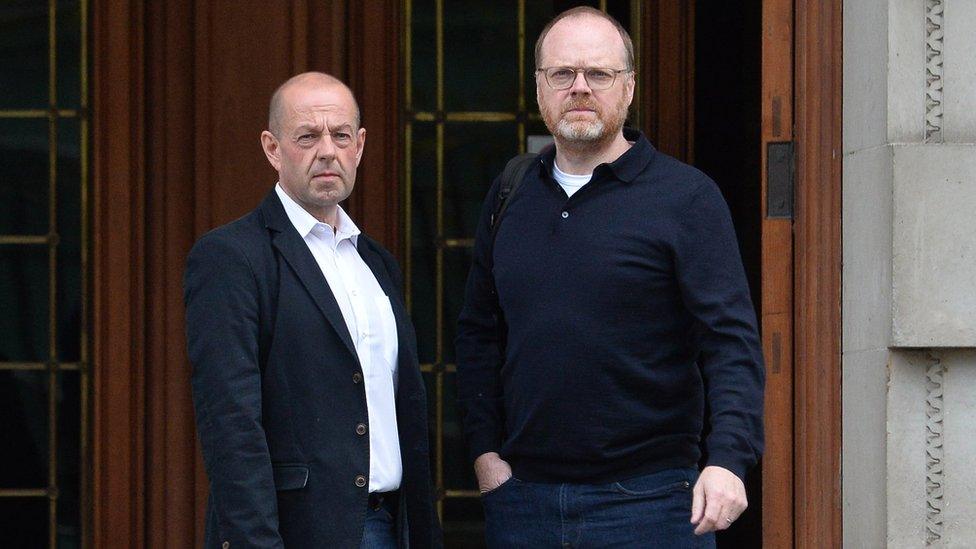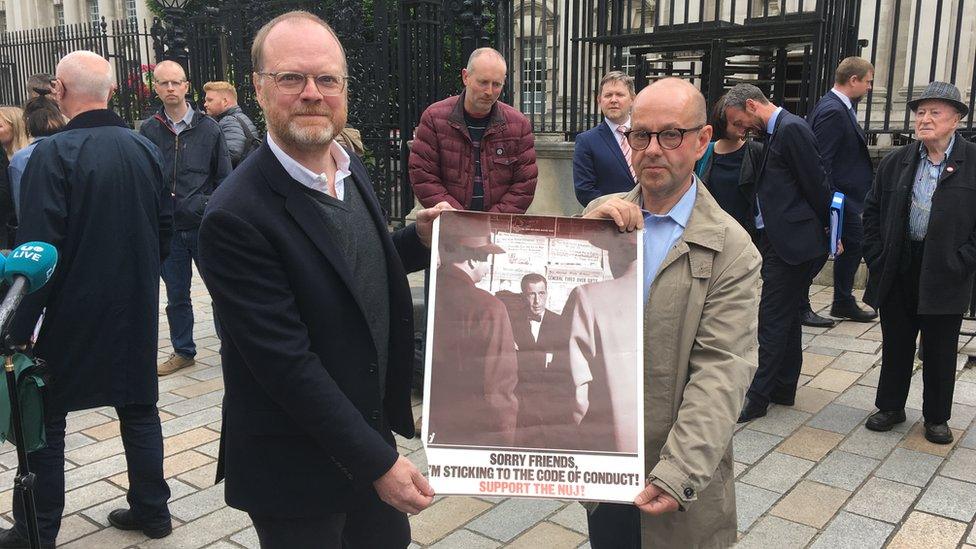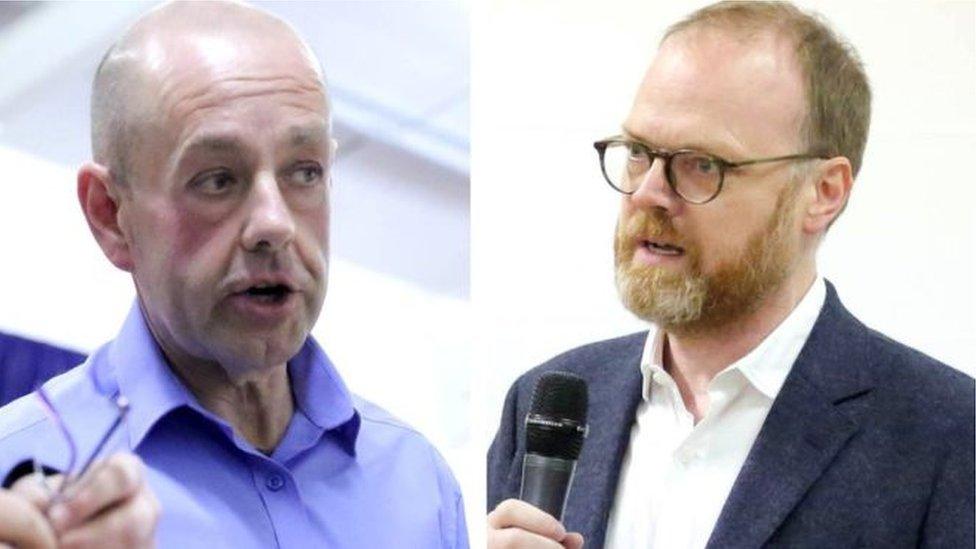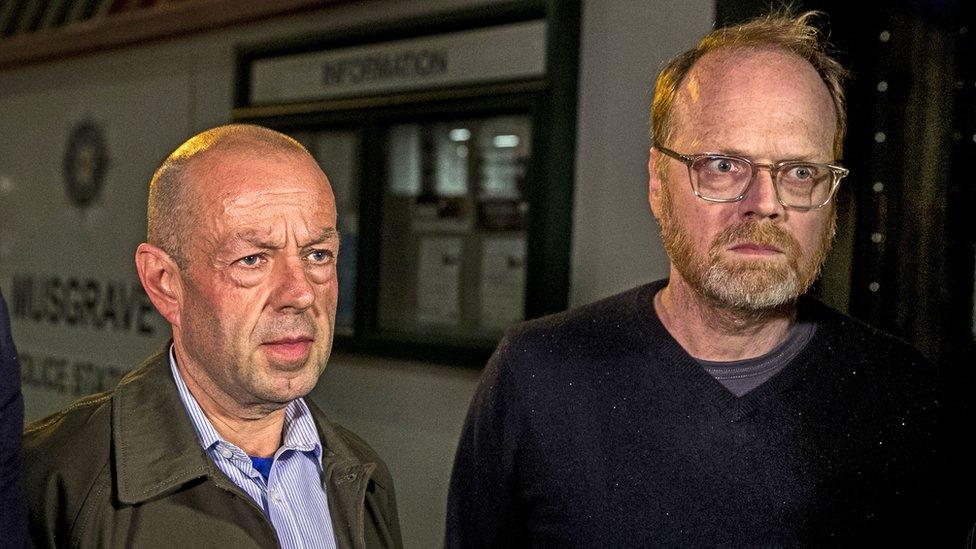PSNI monitored phone of journalist Barry McCaffrey
- Published

Barry McCaffrey (left) made a complaint to the Investigatory Powers Tribunal along with Trevor Birney (right) in 2019
A journalist said he was shocked to discover police had accessed his phone while he was investigating potential corruption in 2013.
Barry McCaffrey complained to the Investigatory Powers Tribunal (IPT) in 2019 after he and a colleague were arrested over their work into Troubles related murders.
But he said in March he discovered the IPT was running another inquiry.
This related to his investigations in 2013.
Those investigations had been looking into the "retire and re-hire scheme" for former officers who had retired from the Police Service of Northern Ireland (PSNI) and were brought back as civilian investigators.
The Detail - Mr McCaffrey's former employer - said he found the IPT had been investigating whether the PSNI's monitoring of his phone during this period was unlawful, external.
Speaking on BBC News NI's Talkback programme, Mr McCaffrey said his inquiries in 2013 began after he was given information of "an alleged financial corruption" involving a PSNI employee.
"I put a call in to the PSNI press office, and just the question was, you know, can you tell me or confirm that there's an investigation into this allegation of financial corruption?" he said.
"What we know now, 10 years later, what we found out earlier this year, was that the police had then gone and taken my phone records to try and identify the whistle-blower."
"Up until March of this year, we didn't even know that the investigation was going on. You know, the PSNI and the IPT have been having secret hearings."
What is the IPT?
The IPT describes itself as an "independent court, established under Section 65 of the Regulation of Investigatory Powers Act 2000 (RIPA).
It considers allegations of unlawful intrusion by public bodies, including the UK intelligence services, the police and local authorities and investigates alleged conduct by or on behalf of the UK intelligence services whether or not it involves investigatory powers.
What was the original complaint made the the IPT about?
In 2018, police raided the homes of Mr McCaffrey and his colleague Trevor Birney and they were arrested over the suspected theft of confidential documents from the Northern Ireland Police Ombudsman's office.
They were detained, questioned and released during an operation undertaken by detectives from Durham Constabulary, supported by PSNI officers.
The investigative journalists had been involved in making a documentary film, No Stone Unturned.
It examined the Royal Ulster Constabulary's handling of the 1994 Loughinisland killings by the loyalist paramilitary group the Ulster Volunteer Force.
During a court hearing it was confirmed that police seized a number of items from the two journalists' homes and offices.
Items seized include memory cards, cameras, phones, computers, cassettes and thousands of files containing millions of pages.

Trevor Birney and Barry McCaffrey had mounted a legal challenge against the police raids
In response to Mr McCaffrey's comments about the latest IPT investigation, a PSNI spokesperson said: "As the matter is subject to ongoing legal proceedings, it would be inappropriate to make any comment at this time."
Alliance Party assembly member Nuala McAllister said the IPT investigation raised "major concerns" about the PSNI,
"It is entirely unacceptable if the PSNI accessed these phone records without permission being granted and we await the findings of the Investigatory Powers Tribunal in their investigation" she said.
Social Democratic and Labour Party assembly member Matthew O'Toole said the police should not be interfering in the work of journalists,
"I acknowledge that police have made significant progress when it comes to journalists' safety, but the media must be free to carry out their work without being impeded by the police service or anyone else" he said.
The National Union of Journalists described the PSNI's actions as a "shocking revelation".
"Trust in the PSNI will not be restored if there is a constant attempt to conceal the truth or to put barriers in the way of those who seek to carry out journalism in the public interest" assistant general secretary Séamus Dooley said.
Related topics
- Published3 June 2019

- Published31 August 2018
